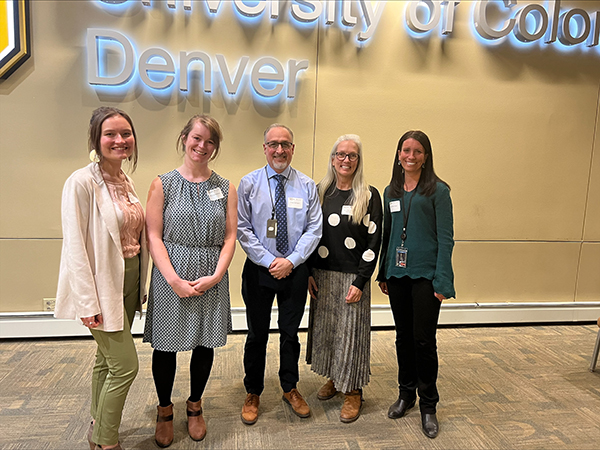Center for Community Safety and Resilience Presents Analysis of Decade-long Colorado Crime Data
Toula Wellbrook | School of Public Affairs Mar 16, 2023
The new Center for Community Safety and Resilience (CCSR), housed at the School of Public Affairs at CU Denver, hosted an event to disseminate the findings of a recently produced report on crime rates in Colorado from 2010 to 2021. The report co-authors are School of Public Affairs faculty Professor and CU Regent Callie Rennison and Dr. Sheila Huss, clinical assistant professor.
Rennison and Huss presented their findings during a Criminal Justice Series event held on March 6 at CU Denver. The long-running series focuses on issues related to crime, justice, and the law. The report co-authors were joined by panelists Elise Schmelzer, safety reporter for the Denver Post, and Craig Spingarn, crime analyst for the Denver Police Department. The event was moderated by Raya Kate Castronovo, a graduate assistant and student at the School of Public Affairs and president of Alpha Phi Sigma – Kappa Xi, the School of Public Affairs chapter of a nationally recognized honor society for students in the criminal justice sciences.
Watch a recording of the event.
Speaking on why the report was produced, Callison said, “It was about educating on the nuances of crime data and what it means and being a critical consumer. One of the things I hope people take away from the report … is that one statement cannot summarize what’s happening in the state.”
Key findings from the report are:
- Burglary rates are down across almost the entire state with a few exceptions.
- DUI- and narcotics-related crime rates have declined almost universally.
- Motor vehicle theft rates have increased uniformly across the state.
- Fraud (larceny) rates have increased across most jurisdictions.
- Violent crime rates are trending upward in most jurisdictions, although a quarter of jurisdictions saw a decrease in violent crime rates.
Read the “Executive Report: Crime Tends in Colorado 2010 – 2021.”
Takeaways from the panel discussion included the underlying complexity of crime data and the need for their careful analysis and interpretation, particularly in the context of the scope of the data collected.
“Personally, the challenge for me is collecting accurate and timely data, stressing accuracy over urgency. A lot of times, there is a quick need to get this information out, but we must pause to make sure the information we’re collecting is accurate, thorough, and complete,” said Spingarn. He gave an example of an instance where there seemingly was a crime hotspot that upon further analysis was explained by data reporting the location where crimes were reported rather than where crimes were committed. Without the deeper dive into the data, an incorrect conclusion would have been drawn about the crime hotspot.
The panel also discussed the role of the media in reporting crime and the impact of its reporting on politics, policymaking, and the criminal justice system – including the impacts of when crime data are misinterpreted or manipulated.
Speaking broadly about all the media that people consume, including television, film, and social media, Schmelzer said, “It’s a broader challenge, in my industry, for journalists to compete with NextDoor, to compete with Facebook groups, where things are free, and whatever information you want is out there. But there’s no one doing the factchecking.”
Connecting the report to her teaching in the Criminal Justice program at the School of Public Affairs, Huss said, “The biggest piece of my job is being an educator, educating students about the complexities associated with violence and the implications of violence. I hope that students take – from my classes and from our undergraduate criminal justice program as a whole – the skills and knowledge into their careers, and use them to help prevent crime, violence, and recidivism.”
A final takeaway from the discussion was that although high-level data can reveal trends in crime rates, they do not provide explanations for those trends. A deeper dive into the data is needed to better understand and explain the causality behind the trends.
About the Criminal Justice Series
The Criminal Justice Series, hosted by the Center for Community Safety and Resilience, focuses on issues related to crime, justice, and the law. Through panel discussions, debates, guest speakers and other formats, we structure civil discourse among experts in the field to promote critical thought and further dialogue that will contribute to better informed citizens and voters. The events are held in person and virtually twice each fall and spring semester.
About the Center for Community Safety and Resilience
The Center for Community Safety and Resilience is a redesigned center that synergizes diverse missions toward one shared vision. Our vision is thriving individuals and families in safe and supportive communities. Our mission is to advance research-based evidence and practice toward individual and community safety, resilience, and justice through effective programs, practitioner, and community education, and public policy advocacy and analysis. For more information, visit publicaffairs.ucdenver.edu/ccsr.